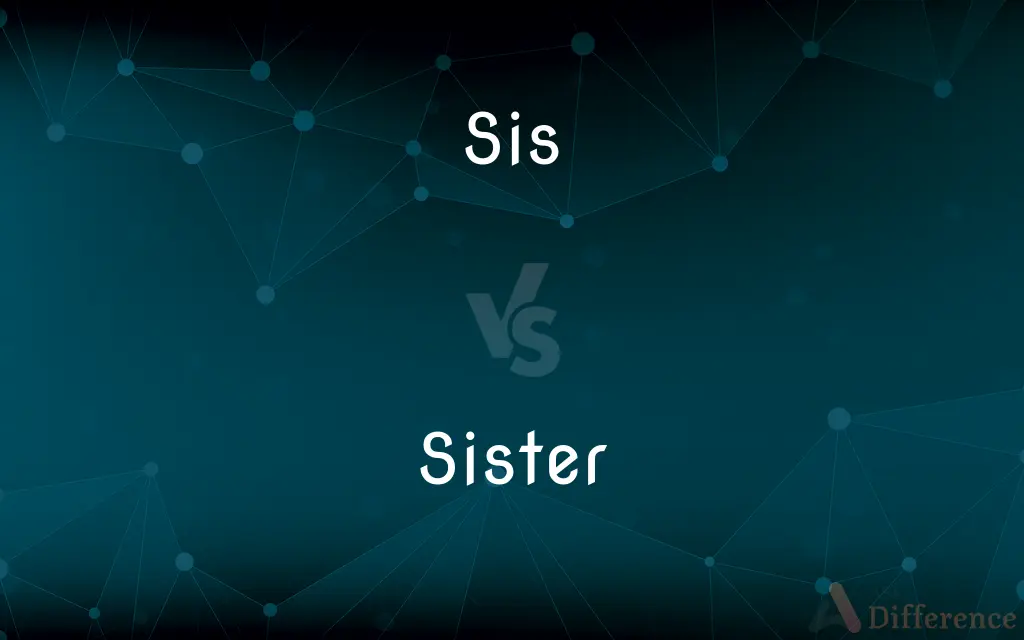Sis vs. Sister — What's the Difference?
By Tayyaba Rehman & Urooj Arif — Updated on March 5, 2024
"Sis" is an informal, affectionate term for a sister, often used in casual contexts, while "sister" is the formal term denoting a female sibling or a woman in a religious order.

Difference Between Sis and Sister
Table of Contents
ADVERTISEMENT
Key Differences
"Sis" is a colloquial term that implies a close, informal relationship. It's often used among peers or in social media to convey warmth and familiarity. On the other hand, "sister" is the standard English term used in both formal and informal contexts to refer to a female sibling.
While "sis" can sometimes be used metaphorically to express camaraderie among women who are not biologically related, "sister" carries a more official or biological implication. However, "sister" can also denote a spiritual or organizational bond, especially in religious contexts.
The usage of "sis" reflects a modern linguistic trend toward abbreviating and personalizing language, making it more relatable, especially among younger generations. Conversely, "sister" remains a constant in the language, maintaining its formal and traditional usage across various contexts.
"Sis" might express a greater sense of intimacy and solidarity, suggesting a bond that goes beyond mere familial ties. Whereas "sister" might be perceived as more distant or formal, depending on the context in which it is used.
"Sis" is often preferred for its brevity and the informal tone it conveys, fitting well into the character limits and casual nature of online chats and social media. In contrast, "sister" might be used in more formal or official documents, communications, and contexts where clarity and tradition are prioritized.
ADVERTISEMENT
Comparison Chart
Formality
Informal
Formal
Usage Context
Casual, social media
All contexts, including religious and familial
Connotation
Affectionate, close
Neutral, official
Relationship
Can be metaphorical for close female friends
Biological or organizational
Emotional Tone
Intimate, friendly
Can vary; formal or caring
Compare with Definitions
Sis
Reflective of a casual or youthful way of speaking.
Sis has always got my back.
Sister
Used to describe a woman in terms of her relationship with her siblings.
She is the oldest sister in her family.
Sis
A short form for sister, denoting a close, informal relationship.
I'm going shopping with my sis this weekend.
Sister
A woman belonging to a religious order.
Sister Mary prays for us every day.
Sis
Can be used to express solidarity among women.
Sis, I'm here for you.
Sister
Can denote a fellow woman, especially in feminist contexts.
Every woman is a sister in the struggle for equality.
Sis
Used among friends as a term of endearment.
You got this, sis!
Sister
A female sibling with whom one shares parents.
My sister and I look very similar.
Sis
A person's sister (often used as a form of address)
Where are you going, sis?
Sister
Reflects a formal or traditional relationship.
I have two brothers and one sister.
Sis
Informal address among women who share a close bond.
Hey sis, how's it going?
Sister
A sister is a woman or girl who shares one or more parents with another individual. The male counterpart is a brother.
Sis
A colloquial abbreviation of Sister.
Sister
A female having the same parents as another or one parent in common with another.
Sis
A female person who has the same parents as another person;
My sister married a musician
Sister
A female member of a religious order; especially one devoted to more active service; (informally) a nun.
Michelle left behind her bank job and became a sister at the local convent.
Sister
A female person who is a fellow member of a sorority or labor union or other group;
None of her sisters would betray her
Sister
Sometimes used as a term of address for attractive young women
Common Curiosities
Can "sis" be used for non-biological relationships?
Yes, "sis" can denote close friendships and solidarity among women.
Can "sister" be used in a casual context?
Yes, but "sis" is more commonly used for casual, affectionate expressions.
In what contexts is "sister" preferred over "sis"?
Formal, official, or traditional contexts, including documentation and when referring to women in religious orders.
Do "sis" and "sister" have different emotional connotations?
"Sis" often conveys more warmth and intimacy, while "sister" can be neutral or formal.
What is "sis" short for?
"Sis" is short for "sister," used informally.
How has the usage of "sis" evolved over time?
Its usage has increased with the rise of social media and digital communication, reflecting a trend towards more informal and affectionate language.
Why might someone use "sis" instead of "sister"?
For a more affectionate, casual tone, especially in digital or informal communication.
Is it appropriate to call someone "sis" in a professional setting?
Generally, no. "Sister" or the person's name is more appropriate.
Can men use "sis" when referring to their sisters?
Yes, "sis" is gender-neutral in terms of who can use it.
Can "sister" signify a spiritual relationship?
Yes, especially in religious or communal settings.
How does the term "sis" affect the perception of female relationships?
It emphasizes closeness and solidarity, potentially strengthening the perception of support and camaraderie.
Is "sister" only for biological relationships?
No, "sister" can also refer to women in religious orders or metaphorically in certain communities.
Does the use of "sis" in social media differ from its use in verbal communication?
In social media, "sis" often carries additional layers of humor, support, or solidarity not always present in verbal use.
Is using "sis" common among all age groups?
It's more common among younger people but is used across a variety of age groups.
Can "sis" and "sister" be used interchangeably?
In many informal contexts, yes, but their appropriateness can vary based on formality and tone.
Share Your Discovery

Previous Comparison
Intuitive vs. Wisdom
Next Comparison
Septagon vs. HexagonAuthor Spotlight
Written by
Tayyaba RehmanTayyaba Rehman is a distinguished writer, currently serving as a primary contributor to askdifference.com. As a researcher in semantics and etymology, Tayyaba's passion for the complexity of languages and their distinctions has found a perfect home on the platform. Tayyaba delves into the intricacies of language, distinguishing between commonly confused words and phrases, thereby providing clarity for readers worldwide.
Co-written by
Urooj ArifUrooj is a skilled content writer at Ask Difference, known for her exceptional ability to simplify complex topics into engaging and informative content. With a passion for research and a flair for clear, concise writing, she consistently delivers articles that resonate with our diverse audience.















































